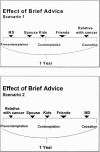Motivating and helping smokers to stop smoking
- PMID: 14687265
- PMCID: PMC1494968
- DOI: 10.1111/j.1525-1497.2003.20640.x
Motivating and helping smokers to stop smoking
Abstract
Smokers try to quit only once every 2 to 3 years and most do not use proven treatments. Repeated, brief, diplomatic advice increases quit rates. Such advice should include a clear request to quit, reinforcing personal risks of smoking and their reversibility, offering solutions to barriers to quitting, and offering treatment. All smokers should be encouraged to use both medications and counseling. Scientifically proven, first-line medications are nicotine gum, inhaler, lozenge, and patch plus the nonnicotine medication bupropion. Proven second-line medications are clonidine, nicotine nasal spray, and nortriptyline. These medications are equally effective and safe and the incidence of dependence is very small. The proven psychosocial therapies are behavioral and supportive therapies. These are as effective as medications and are effective via individual counseling, group, and telephone formats. The writing of this article was supported in part by Senior Scientist Award DA-00450 from the National Institute on Drug Abuse.
Figures
References
-
- Center for Disease Control and Prevention. Cigarette smoking among adults—United States, 1998. Morb Mortal Wkly Rep. 2000;49:881–4. - PubMed
-
- Cohen S, Lichtenstein E, Prochaska JO, et al. Debunking myths about self-quitting. Am Psychol. 1989;44:1355–65. - PubMed
-
- Hughes JR. The evidence for hardeningIs the target hardening? NCI Smoking and Tobacco Control Monograph. Bethesda, MD: U.S. Department of Health and Human Services, National Institutes of Health, National Cancer Institute; 2001.
-
- Hughes JR, Gulliver SB, Fenwick JW, et al. Smoking cessation among self-quitters. Health Psychol. 1992;11:331–4. - PubMed
Publication types
MeSH terms
Grants and funding
LinkOut - more resources
Full Text Sources
Medical

